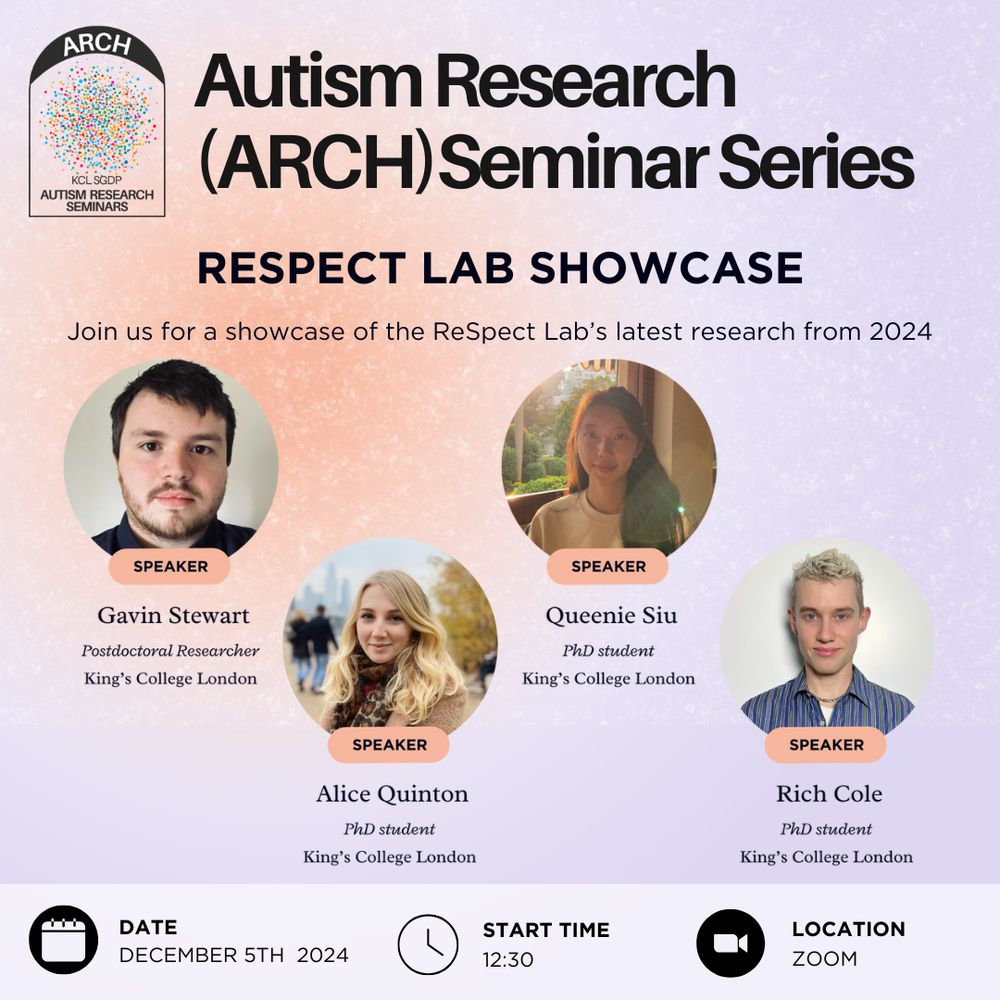
Interested in PDA, autism and cognition 🧠
#actuallyautistic #audhd
Non-binary scientist (they/them)
On other things @aegriffcogneuro(@mastodon.world)
May also post about TTRPGs, the NFL 🐬 and Nintendo
🏳️🌈🏳️⚧️🇬🇧🇺🇸
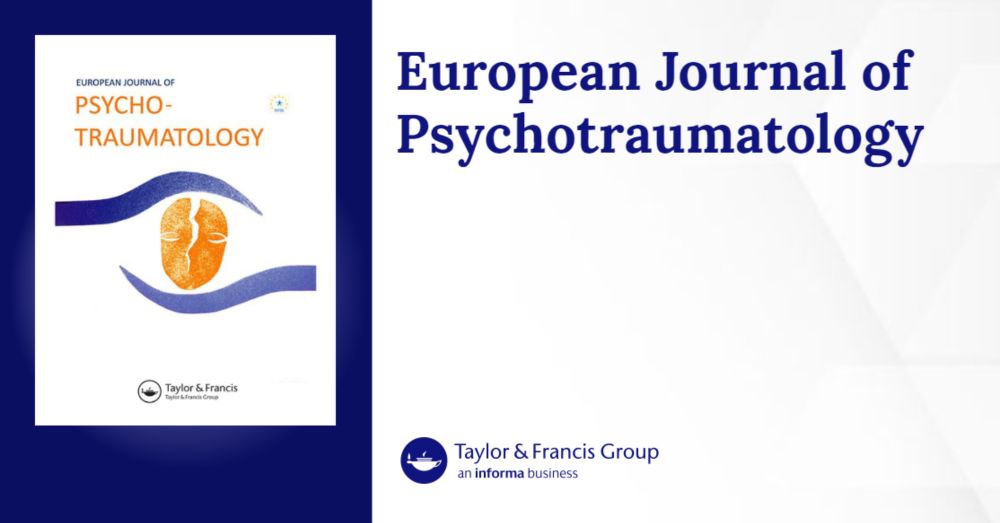
Larysa Zasiekina, @sjblakemore.bsky.social, Iryna Hlova, @bignardi.bsky.social and I investigated the prevalence of PTSD in adolescents who have experienced war.
Our systematic review and meta-analysis is linked below, but read on for highlights… 🧵
doi.org/10.1080/2000...
Join us on December 10th to hear Howard Childs discuss a service evaluation of adult autism assessment centres.
Find tickets @ www.eventbrite.co.uk/e/arch-semin...
We hope to see you there!

Join us on December 10th to hear Howard Childs discuss a service evaluation of adult autism assessment centres.
Find tickets @ www.eventbrite.co.uk/e/arch-semin...
We hope to see you there!
Really looking forward to hearing about this interesting and valuable work. Come along if you can, and also get in touch if you have some work you'd like to share with us too 👀
Join us on October 22nd to hear from Nell Fahey (with introduction from Dr Gavin Stewart) about their work on the social experiences of middle-aged and older autistic adults.
More info on our mailout - sign up and get tickets @ www.eventbrite.co.uk/e/arch-semin...

Really looking forward to hearing about this interesting and valuable work. Come along if you can, and also get in touch if you have some work you'd like to share with us too 👀
- 15 minute survey followed by a 1 hour interview
Interested?
✉️ Please message me: [email protected]
Thanks for sharing!

- 15 minute survey followed by a 1 hour interview
Interested?
✉️ Please message me: [email protected]
Thanks for sharing!
Eunhee Kim, a PhD student from Bournemouth University, is presenting her research on health and wellbeing in menopause in autistic and non-autistic people. This is our last talk of the academic year: we hope to see you there!
Tickets can be found at: t.co/K5ZlvIs5YS
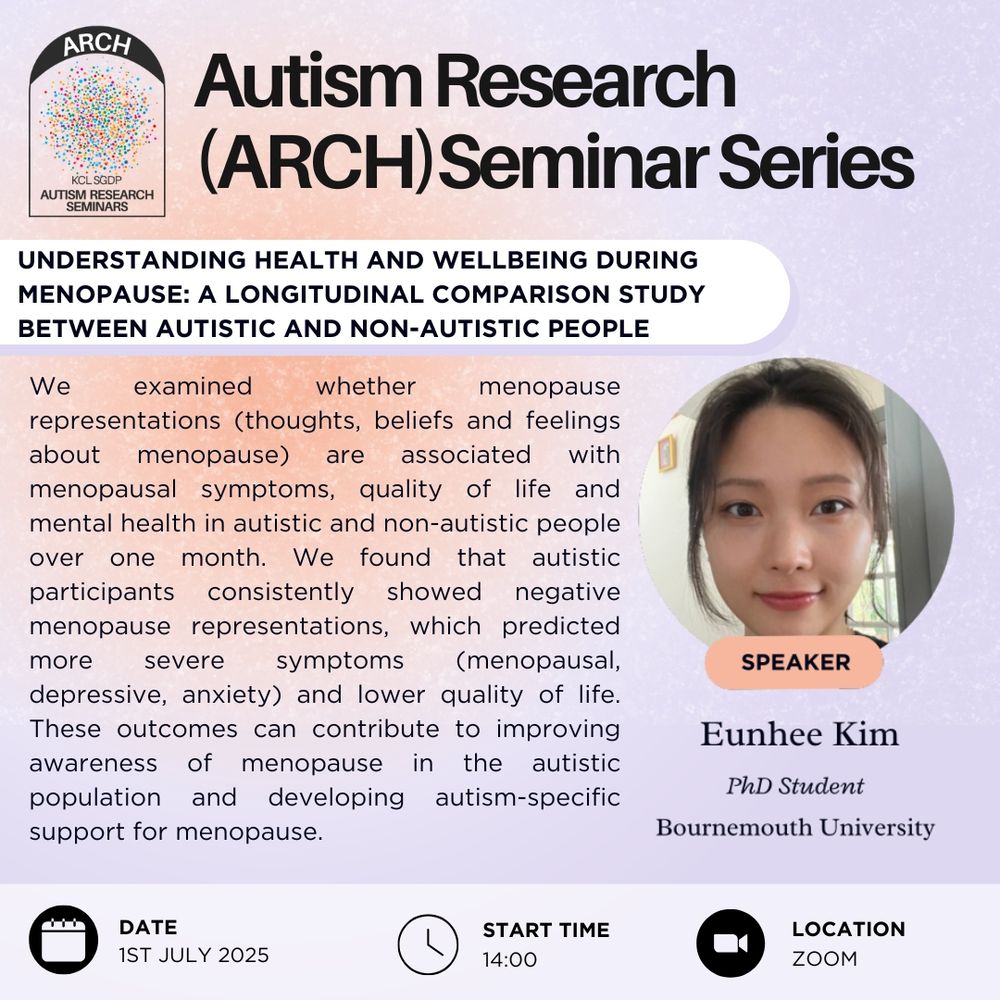
Eunhee Kim, a PhD student from Bournemouth University, is presenting her research on health and wellbeing in menopause in autistic and non-autistic people. This is our last talk of the academic year: we hope to see you there!
Tickets can be found at: t.co/K5ZlvIs5YS
Larysa Zasiekina, @sjblakemore.bsky.social, Iryna Hlova, @bignardi.bsky.social and I investigated the prevalence of PTSD in adolescents who have experienced war.
Our systematic review and meta-analysis is linked below, but read on for highlights… 🧵
doi.org/10.1080/2000...

Larysa Zasiekina, @sjblakemore.bsky.social, Iryna Hlova, @bignardi.bsky.social and I investigated the prevalence of PTSD in adolescents who have experienced war.
Our systematic review and meta-analysis is linked below, but read on for highlights… 🧵
doi.org/10.1080/2000...
drive.google.com/file/d/1RIvg...
drive.google.com/file/d/1RIvg...
Join us on May 28th at 2PM to hear Kayleigh Doyle (@kayleighdoyle.bsky.social) discuss her PhD work looking at using the creative arts to teach autistic students.
Tickets are available at eventbrite.co.uk/e/arch-semin...
We hope to see you there!
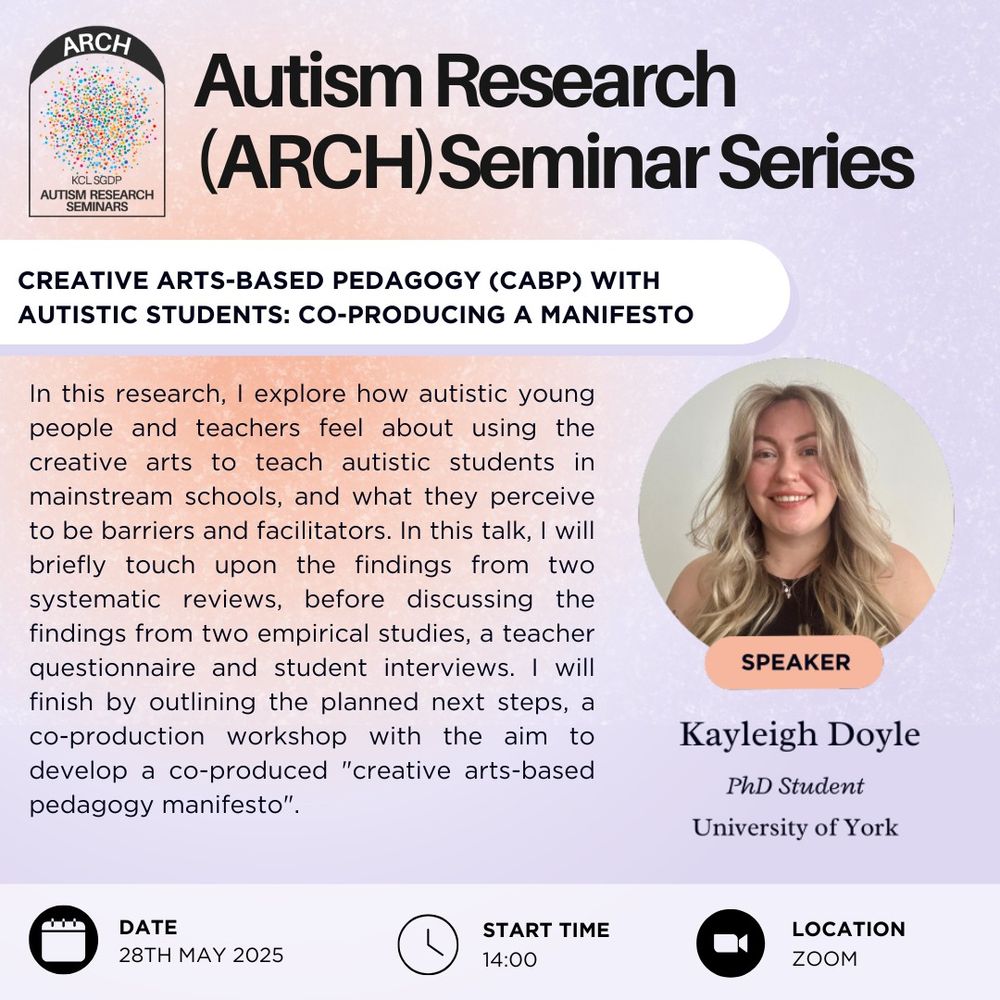
Join us on May 28th at 2PM to hear Kayleigh Doyle (@kayleighdoyle.bsky.social) discuss her PhD work looking at using the creative arts to teach autistic students.
Tickets are available at eventbrite.co.uk/e/arch-semin...
We hope to see you there!
Join us on April 16th to see @lomasresearch.bsky.social discuss his PhD research exploring the usefulness of Theory of Mind in pedagogy.
Tickets can be found here: eventbrite.co.uk/e/arch-semin...
We hope to see you there!
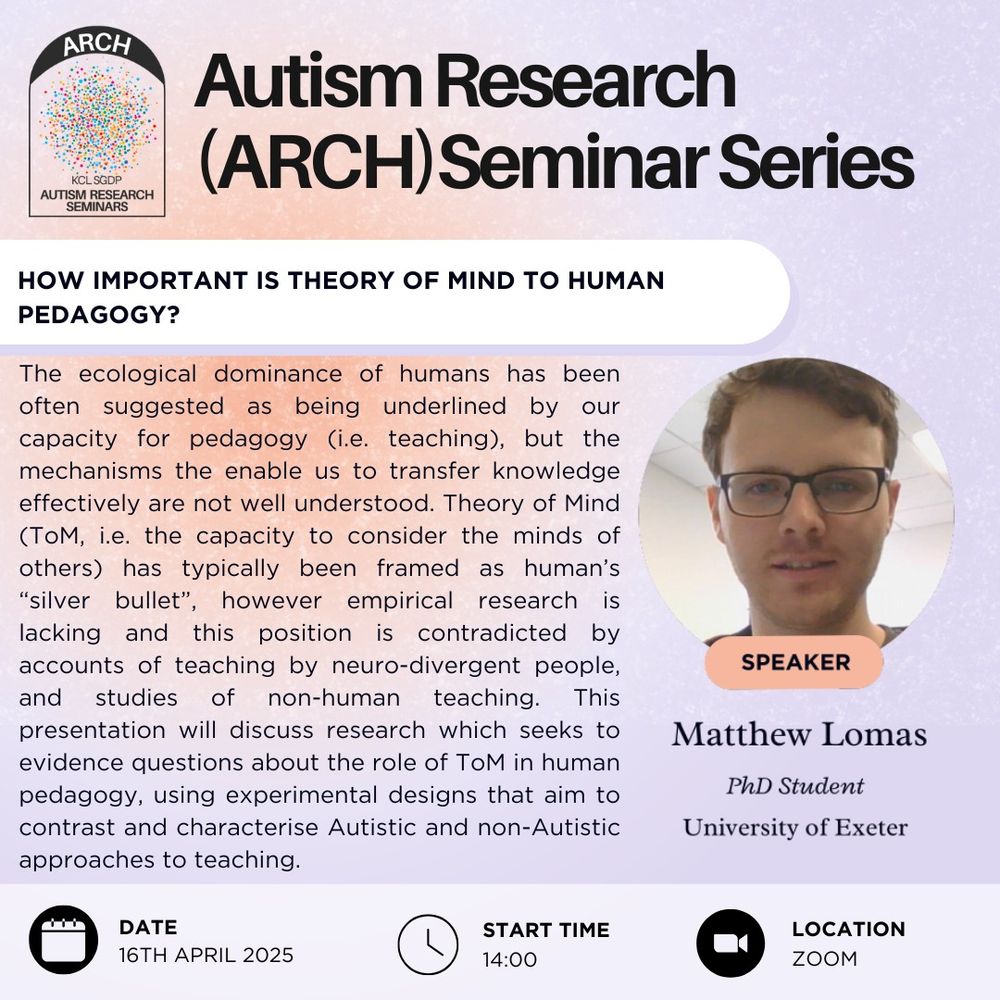
Join us on April 16th to see @lomasresearch.bsky.social discuss his PhD research exploring the usefulness of Theory of Mind in pedagogy.
Tickets can be found here: eventbrite.co.uk/e/arch-semin...
We hope to see you there!
We're exploring how autistic people use their strengths to manage differences. Participants must:
✅Self-identify as #autistic OR have an #autism diagnosis
✅18 yrs+
✅Speak English
Take part in our #AutismResearch 👉 qualtrics.kcl.ac.uk/jfe/form/SV_...

We're exploring how autistic people use their strengths to manage differences. Participants must:
✅Self-identify as #autistic OR have an #autism diagnosis
✅18 yrs+
✅Speak English
Take part in our #AutismResearch 👉 qualtrics.kcl.ac.uk/jfe/form/SV_...
Due to unforeseen circumstances, this month's talk will now be given by
@sophphillips32.bsky.social, and will be on her research on autistic women's experiences of higher education.
Tickets are still available through eventbrite.co.uk/e/arch-semin...
We hope to see you there!
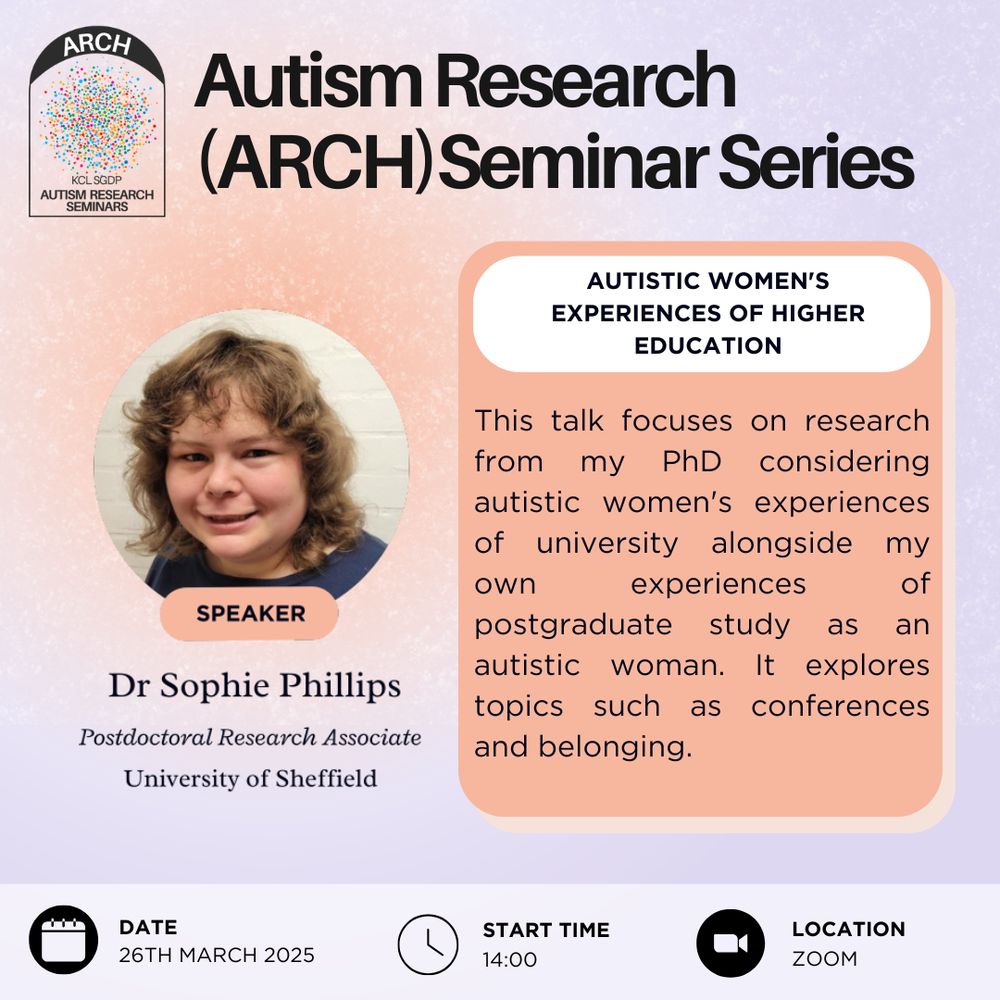
Due to unforeseen circumstances, this month's talk will now be given by
@sophphillips32.bsky.social, and will be on her research on autistic women's experiences of higher education.
Tickets are still available through eventbrite.co.uk/e/arch-semin...
We hope to see you there!
If you're one or several of the above (or none), please go to edin.ac/4h1ghPU or get in touch w them!
TY
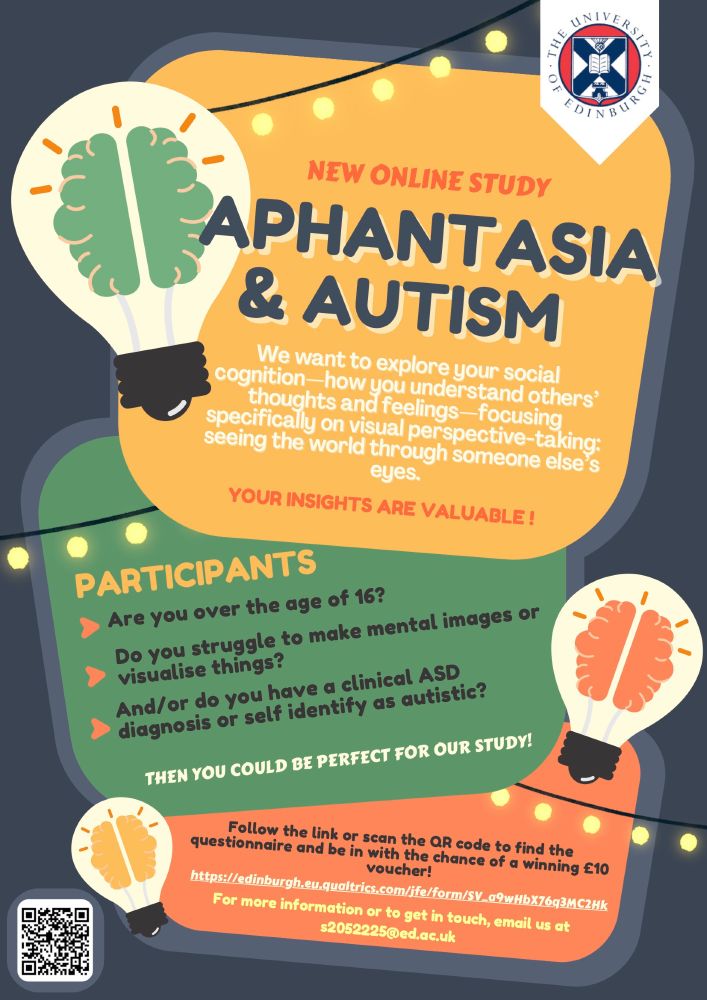
If you're one or several of the above (or none), please go to edin.ac/4h1ghPU or get in touch w them!
TY
The next ARCH talk will be held at 2pm, March 26th, with Ashlea Cromby talking about her work on autistic communication via memes!
Tickets can be found @ t.co/K5ZlvIsDOq
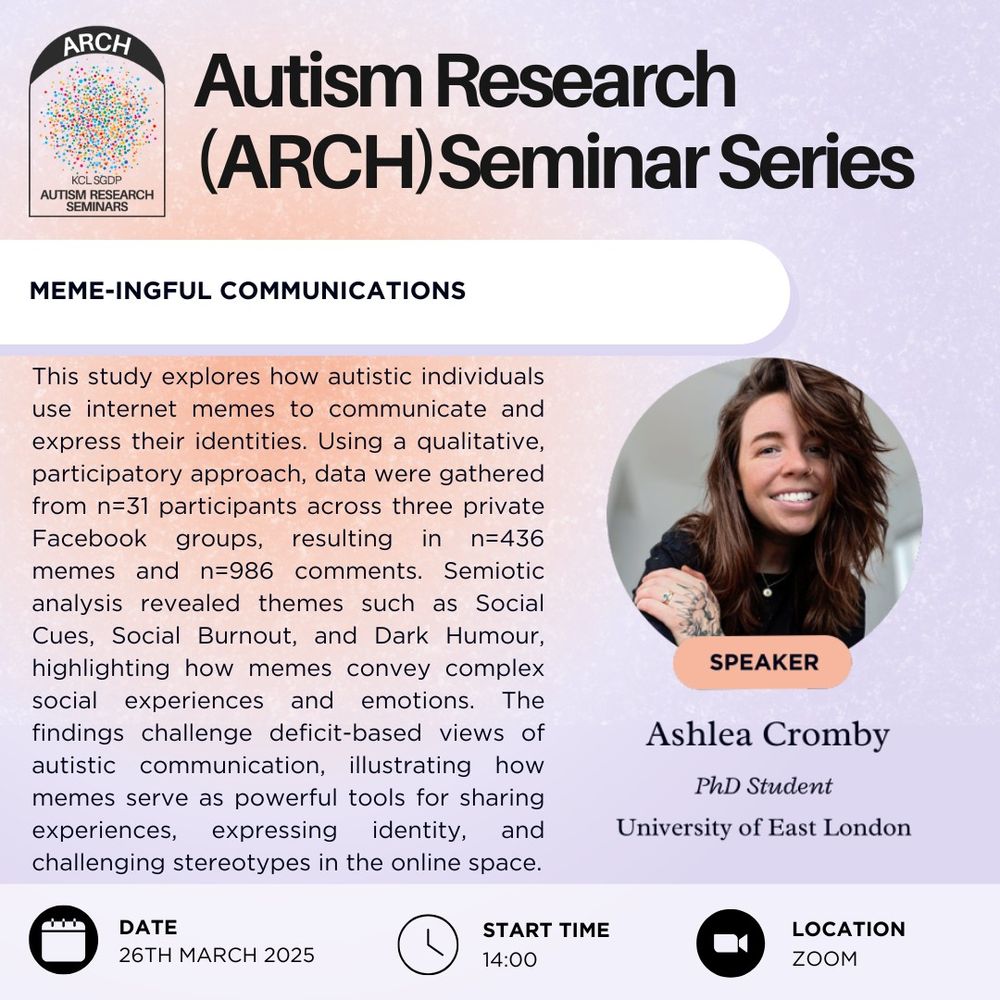
The next ARCH talk will be held at 2pm, March 26th, with Ashlea Cromby talking about her work on autistic communication via memes!
Tickets can be found @ t.co/K5ZlvIsDOq
📹 Watch, share, & join the conversation
youtu.be/GVrq9EL0mzg?...
#AutismAwareness #Neurodiversity #AutisticGirls #Edpsychs #Edusky

📹 Watch, share, & join the conversation
youtu.be/GVrq9EL0mzg?...
#AutismAwareness #Neurodiversity #AutisticGirls #Edpsychs #Edusky
In today’s @theguardian.com www.theguardian.com/commentisfre...

In today’s @theguardian.com www.theguardian.com/commentisfre...
The next ARCH talk will be held at 2pm, February 19th, and tickets can be found @ www.eventbrite.co.uk/e/arch-semin...
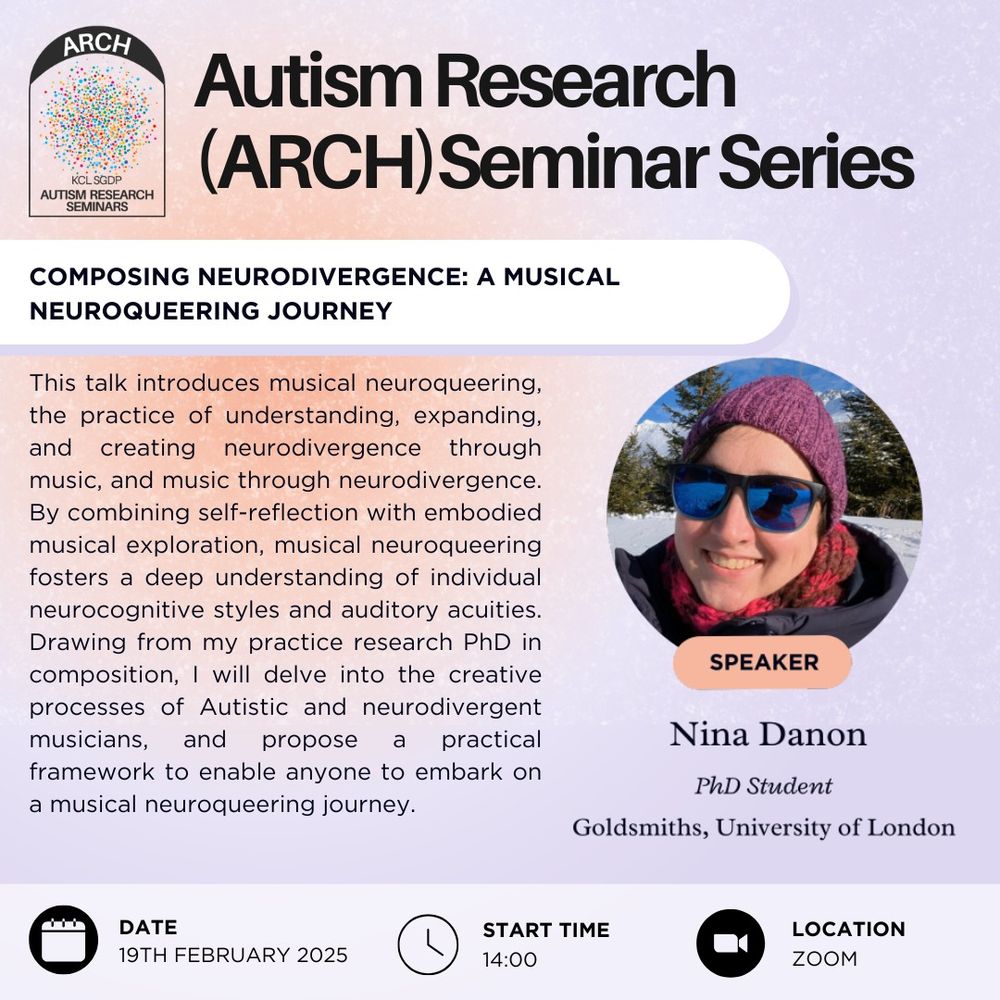
The next ARCH talk will be held at 2pm, February 19th, and tickets can be found @ www.eventbrite.co.uk/e/arch-semin...
@heasutherland
will talk about her ethnographic work on communication in high support needs autistic adults in support services.
Register for free @ www.eventbrite.co.uk/e/arch-semin...
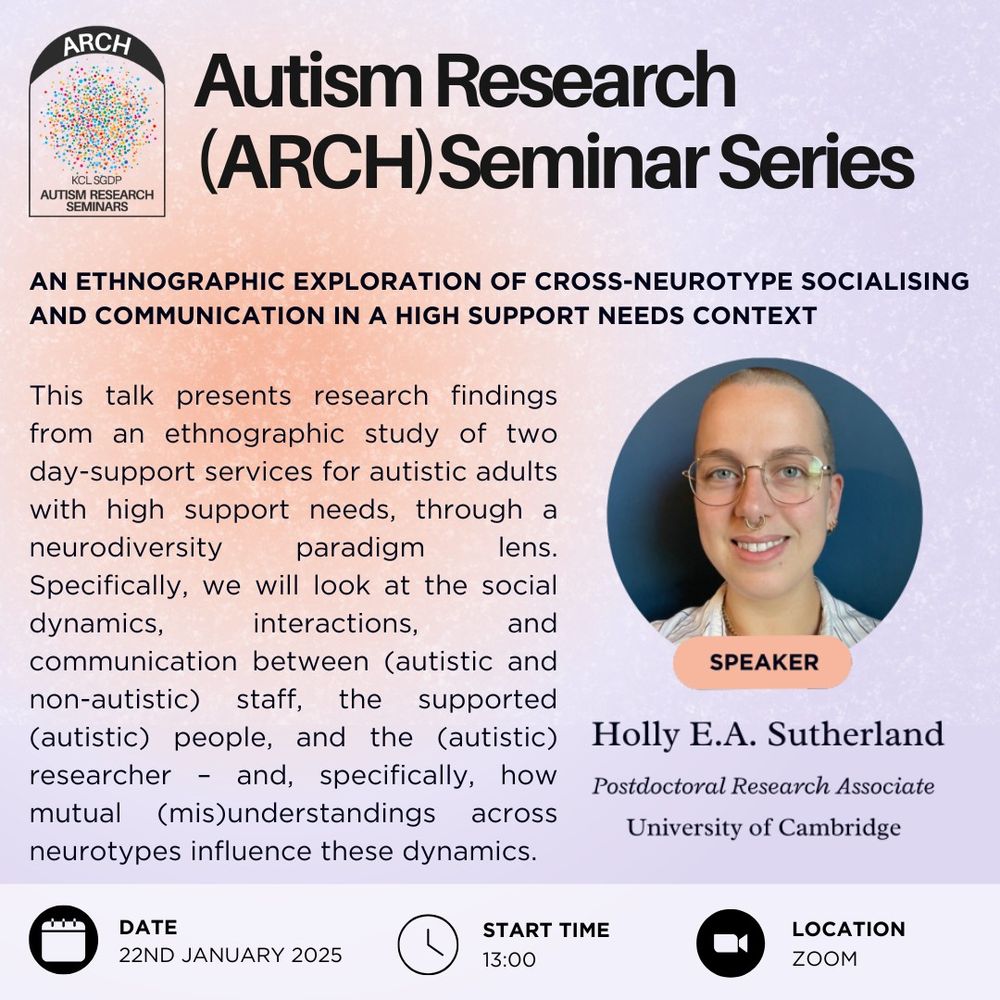
www.timeshighereducation.com/campus/how-s...

www.timeshighereducation.com/campus/how-s...
Dr Gemma Knowles @kingsioppn.bsky.social is recruiting two 2-year full-time postdocs to join our soon-to-start project on the causes and potential solutions to gender inequalities in youth mental health! See www.kcl.ac.uk/jobs/103685-... for more info on post and how to apply!
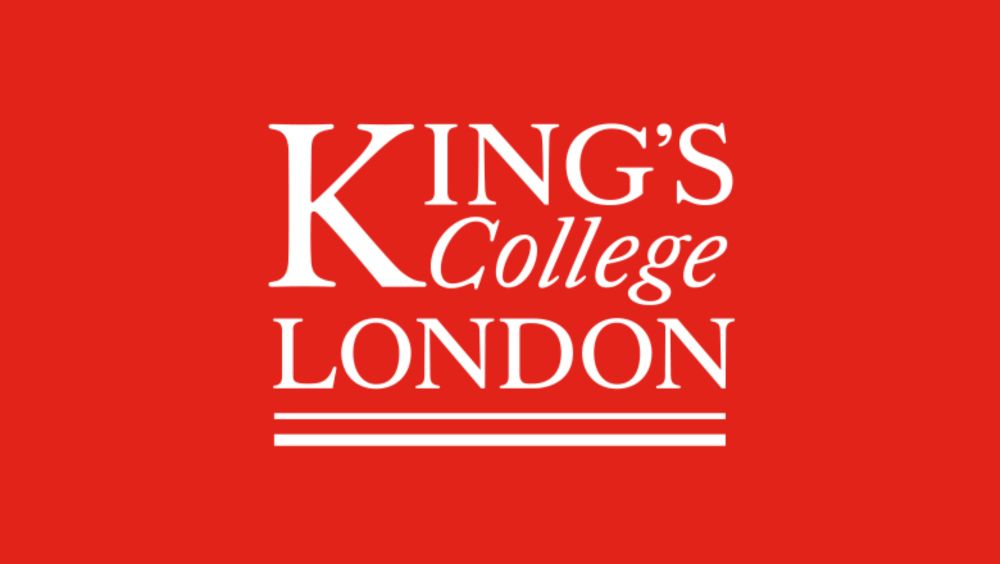
Dr Gemma Knowles @kingsioppn.bsky.social is recruiting two 2-year full-time postdocs to join our soon-to-start project on the causes and potential solutions to gender inequalities in youth mental health! See www.kcl.ac.uk/jobs/103685-... for more info on post and how to apply!
Funding is provided for a PhD student in our new centre to help work with Fiona Zisch & Sean Hanna to apply agent-based-modelling to analyse the crazy data set from 100+ people navigating a giant maze in PEARL. See details:
www.ucl.ac.uk/bartlett/arc...
Funding is provided for a PhD student in our new centre to help work with Fiona Zisch & Sean Hanna to apply agent-based-modelling to analyse the crazy data set from 100+ people navigating a giant maze in PEARL. See details:
www.ucl.ac.uk/bartlett/arc...
www.jobs.cam.ac.uk/job/49880/
www.jobs.cam.ac.uk/job/49880/
Please share widely.
Want more info? See here: www.linkedin.com/feed/update/...
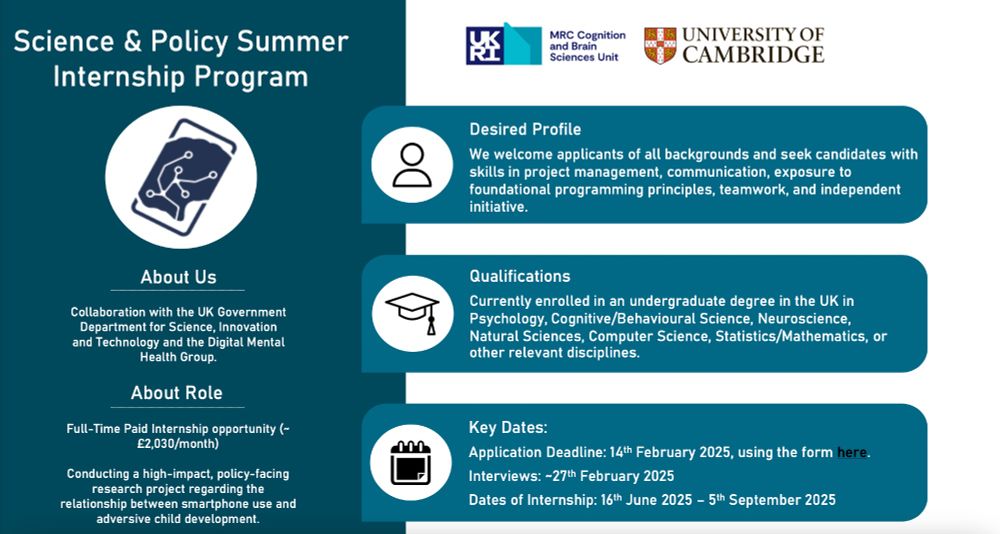
Please share widely.
Want more info? See here: www.linkedin.com/feed/update/...
@heasutherland
will talk about her ethnographic work on communication in high support needs autistic adults in support services.
Register for free @ www.eventbrite.co.uk/e/arch-semin...

@heasutherland
will talk about her ethnographic work on communication in high support needs autistic adults in support services.
Register for free @ www.eventbrite.co.uk/e/arch-semin...
Mine and @bethanyjcliffe.bsky.social’s study on UK doctoral student experiences of self-relevant #mentalhealthresearch is closing at the end of this week! This means you have 4️⃣ more days to take part 👉 uniofbath.questionpro.eu/doctoral-sel...
#PhDSky #PsychSciSky
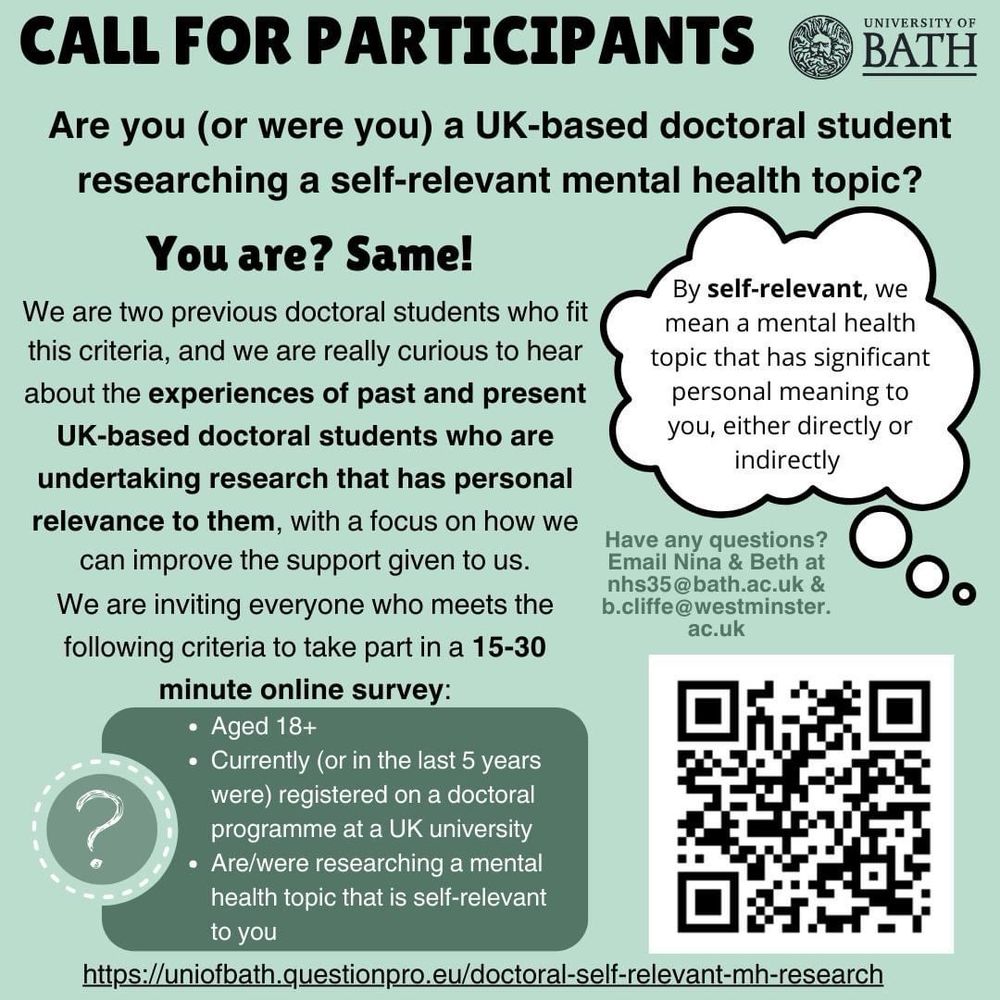
Mine and @bethanyjcliffe.bsky.social’s study on UK doctoral student experiences of self-relevant #mentalhealthresearch is closing at the end of this week! This means you have 4️⃣ more days to take part 👉 uniofbath.questionpro.eu/doctoral-sel...
#PhDSky #PsychSciSky
On December 5th, members of the ReSpect Lab will be showcasing their research from the last year.
Tickets are available @ www.eventbrite.co.uk/e/arch-semin...
We hope to see you there!
